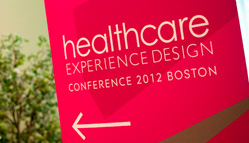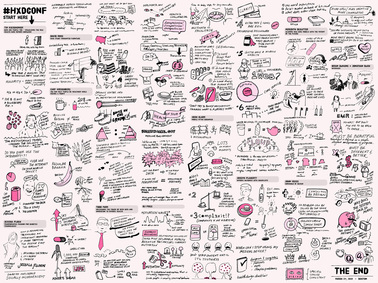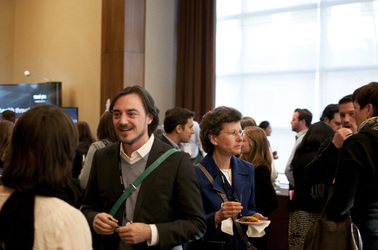Three things from the Healthcare Experience Design Conference that I am still thinking about
At Ultravirgo, we have long been passionate about using our creative skills to improve health, and many of our favorite projects have been for clients in health-related industries. With this in mind, I headed up to the Healthcare Experience Design Conference in Boston a couple weeks ago to get more perspective on the issues at the intersection of design and healthcare. While most of our work is on the communication side - branding and design, rather than developing the experience itself* - our ever-growing interest in health has us constantly looking for new ways to use design to improve health.
I wanted to recap a few of the main thoughts that were going through my head during the day that have stuck with me since. This is my personal takeaway - for more of an overview of the Conference, check out the coverage on HealthcareITNews, the great sketch notes from Cassie McDaniel and Jason Robb, or go straight to the presenter videos that have been posted online.
Check out Cassie McDaniel's amazingly well-organized sketchnotes from the day!
The fact that the new CTO of the US Government comes from the health industry is huge. The fact that it is Todd Park is a godsend.
The clear highlight of the conference was Todd Park, former CTO of the Department of Health and Human Services, who got the big promotion to CTO ('Entrepreneur in Residence') of the United States mere weeks before the conference. He spoke of his work 'liberating data' at HHS with a passion that rivals that of a motivational speaker - garnering a standing ovation from the crowd. In fact, his vision of using data to do for health what NOAA did for weather has real, powerful implications for the future of the field. Just take a look at the vast amounts of free data already available at health.data.gov and it's easy to imagine the 'ecosystem of innovation' they are building with developer challenges and the Health Datapalooza. My take: When we look back at the health/tech industry in 10 years, Todd Park's work at HHS will be seen as a key transformation point that helped enable a revolution in how people understand their health. It will be particularly interesting to see how his background in health shapes his work in his new, broader role. I, for one, am inspired to take some of that data and build something with it - and with the availability of funding and promotion through things like Brooklyn Beta Summer Camp and kickstarter, we might just need to get one of our ideas off the ground...
Healthy and sustainable food needs a rebranding.
Two of the keynotes - Gary Hirschberg, Co-Founder of Stonyfield Farm, and Robyn O'Brien, founder of Allergy Kids - spoke of how the food we eat has changed drastically in recent years - and how this change has largely gone unchallenged (or unnoticed) by the general public. Increased use of ever-stronger pesticides, genetically-engineered produce, and the shift toward corporate ownership (and the resulting focus on profit and shareholder value) add up to food that is measurably worse for us than the same items consumed just a few generations ago. As was pointed out, the 'organic' food that is now seen as 'special' is really the 'normal' food from a few decades ago. It is the 'normal' that has changed measurably in terms of genesis and toxicity. Both Gary and Robyn are doing amazing things to help change this, including the JustLabelIt campaign (a petition to get the FDA to label GE foods) and the ongoing actions of their own organizations. But Gary offered what I see as the real solution toward mass change: finding new paths to loyalty not based on cheap. Sure, to a man with a hammer every problem looks like a nail - but to me this is a branding issue.
My take: When a consumer is in the store choosing between the 99¢ organic apple and the 59¢ regular apple, she sees no difference. In her head she knows that 'organic' is supposed to be a little better for the environment, and probably also thinks that the apple is really there for the 'granola-crunchy hippies' to buy. There is simply not enough in her mental perception of organic to overcome the price difference - they're both the same apple to her. And no amount of packaging or labeling is going to change that in a meaningful way.
In order to have a different (healthier) outcome, she needs to go into the store with a different frame of mind. Take as an example Absolut vodka (which I happened to work on many years ago). The average consumer simply cannot tell the difference between vodkas. Yet Absolut came along and singlehandedly created a 'premium' market purely through advertising and branding - making the public lust after it and changing drinking behavior on a mass scale (well beyond their own product sales). What the organic industry needs now is a savvy forward-thinking brand that can make 'organic' lustworthy - a label people are proud to adopt and evangelize. The benefits are there - it's a matter of making them relevant.
Now to be clear, organic is one small part of eating healthy, and eating healthy is one small part of improving health (and there are far less healthy things to eat than a non-organic apple). But at every step of the way, I am now looking for ways to use the tools of design, branding and communication to make positive change in cultural perceptions of what it means to be 'healthy' - before the consumer goes into the store to buy that apple.
Do what you are passionate about.
The other thing that struck me was the passion that both the speakers and attendees brought to their work. Everyone, it seems, had an intensely personal story of why they are doing what they do. John Weiss, Executive Creative Director of WebMD Health Services opened his talk with a powerful story of the births of his nieces. Jessica Floeh, founder of Hanky Pancreas (best company name ever!) used fashion design to rethink the relationship to her insulin pump, and in the process turned the general perception of living with a medical device is on its head. And many of the attendees have startups battling issues they have personal experience with.
My take: Stories like these are great, but bring to mind a number of questions about the nature of inspiration and what it takes to bring a breakthrough product to market. Are designer/users of a product better at developing that product than designers 'for hire'? Is this approach to building a product a viable short-circuit for user research - or merely a source of inspiration? Does the rapid increase of conditions like diabetes in this country therefore bring an increase in innovation in that field? If that is the case, is it then too late? I feel fortunate to not have such life-defining health issues - which makes me all the more passionate about creating change before I do, and not in reaction to.
Proof that I was, indeed, there and not just reporting from a twitter feed or online accounts...
At the end of the day, literally, I was excited about the innovations and range of application of design for improving the experience of healthcare. Healthcare as an industry is in dire need of Design on many levels, and we seem to be at the beginning of a wave of massive innovation.
* The biggest exception being our work with Virgil to redesign their admissions process - to improve the patient experience, automatically screen/match potential patients to facility capabilities, and reduce errors in admission information capture.
Photos from official conference pics, see them all here.



